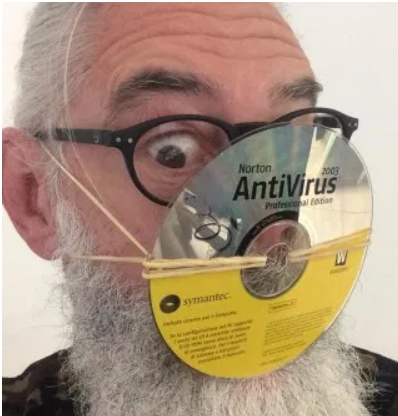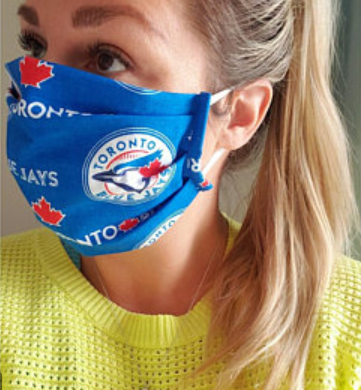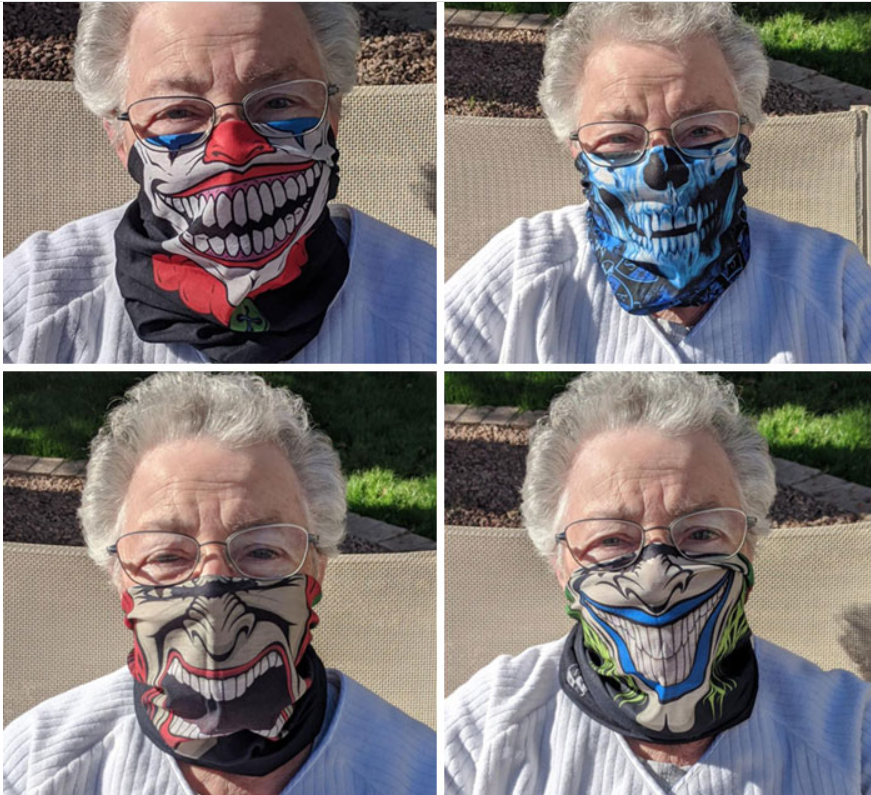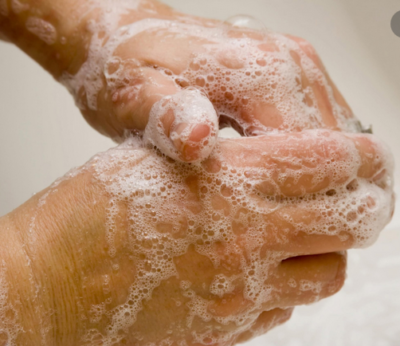 By Pepper Parr
By Pepper Parr
May 31st, 2020
BURLINGTON, ON
There is a crusty old salt in the east end of the city who from time to time send us a note that actually makes a lot of sense.
Let me share it with you,

That’s creative – effective, not so.
“On the matter of masks” he opines. ”And looking beyond the junk science and conspiracy theories that abound and confuse, I think it is fairly obvious that wearing masks is at very least …. Helpfull … And just possibly more than that. Especially in preventing transmission.

Masks have gone corporate.
“I think we can also agree that masks are virtually useless at preventing reception/ingress via droplet /aerosol/ physical proximity or contact, and we have to be careful not to let our mask lull us into a false sense of safety.
“I’d suggest the mask argument is situational.
“I don’t wear a mask when I take my daily walk and I certainly don’t wear it at home.
“I do wear it every time I’m in my apartment elevator as a courtesy to others. NOT to protect myself.. It won’t!

You should get a prize for wearing one of these.
“I wear one when I go shopping and believe all stores should insist on wearing them within the store.
“And by the BTW, the LCBO should be emulating other retailers.
“I don’t wear it in the car on the way to and from but again …. In the elevator going home.

Hand washing is the best defence you have – and it costs next to nothing.
“I protect myself with an almost paranoid hand washing and sanitizing regime.
“People have the right to choose Not To Wear Masks. If they choose that option the store owner or other patron’s rights must hold equal value and suasion.
“No Mask …. No Entry …. is a reasonable position. Someone much smarter than me once said …”Your right to swing your fist freely … ends at m y nose!”
“There is probably a universal agreement that masks, while imperfect and certainly not foolproof, do help.
“Stay safe, keep others safe …. Wear a mask where appropriate, and as my old Mum always said: “Have You Washed Your Filthy Hands Yet?” She actually yelled it more than simply suggesting it.















As far as I’m concerned there is far too much unsupported misinformation being spread around here on the effectiveness of masks.
The latest science weigh-in on this is at;
https://retractionwatch.com/2020/06/01/top-journal-retracts-study-claiming-masks-ineffective-in-preventing-covid-19-spread/
It says;
“Top journal retracts study claiming masks ineffective in preventing COVID-19 spread”
“One of the world’s leading medical journals has retracted a widely circulated paper published in April that concluded that “both surgical and cotton masks seem to be ineffective in preventing the dissemination of SARS–CoV-2 from the coughs of patients with COVID-19 to the environment and external mask surface.”
The study, published by the Annals of Internal Medicine, has been cited by dozens of news stories, nearly 10,000 Twitter users — some of whom raised red flags about its methods — and by the World Health Organization.
But it turns out that the authors failed to consider the limits of the test they were using to detect the presence of coronavirus.
The paper only involved four participants. Apparently, the authors thought a correction — adding more patients — would be enough:
According to recommendations by the editors of Annals of Internal Medicine, we are retracting our article, “Effectiveness of Surgical and Cotton Masks in Blocking SARS-CoV-2. A Controlled Comparison in 4 Patients,” which was published on Annals.org on 6 April 2020 (1).
We had not fully recognized the concept of limit of detection (LOD) of the in-house reverse transcriptase polymerase chain reaction used in the study (2.63 log copies/mL), and we regret our failure to express the values below LOD as “<LOD (value).” The LOD is a statistical measure of the lowest quantity of the analyte that can be distinguished from the absence of that analyte. Therefore, values below the LOD are unreliable and our findings are uninterpretable. Reader comments raised this issue after publication. We proposed correcting the reported data with new experimental data from additional patients, but the editors requested retraction.
I think we need to provide some support for making bold and definitive statements about COVID19 and the need for and effectiveness of measures of protection. At least try to support with evidence what your point is.
Personal opinion on your choices, as examples, are fine, but stating things as real facts is different.
This is from,
https://science.sciencemag.org/content/early/2020/05/27/science.abc6197.full
It says:
1. Masks reduce airborne transmission.
Infectious aerosol particles can be released during breathing and speaking by asymptomatic infected individuals. No masking maximizes exposure, whereas universal masking results in the least exposure.
2. Ultimately, the amount of ventilation, number of people, how long one visits an indoor facility, and activities that affect air flow will all modulate viral transmission pathways and exposure (10). For these reasons, it is important to wear properly fitted masks indoors even when 6 ft apart.
3. After evidence revealed that airborne transmission by asymptomatic individuals might be a key driver in the global spread of COVID-19, the WHO recommended universal use of face masks. Masks provide a critical barrier, reducing the number of infectious viruses in exhaled breath, especially of asymptomatic people and those with mild symptoms (12) (see the figure). Surgical mask material reduces the likelihood and severity of COVID-19 by substantially reducing airborne viral concentrations (13). Masks also protect uninfected individuals from SARS-CoV-2 aerosols (12, 13). Thus, it is particularly important to wear masks in locations with conditions that can accumulate high concentrations of viruses, such as health care settings, airplanes, restaurants, and other crowded places with reduced ventilation. The aerosol filtering efficiency of different materials, thicknesses, and layers used in properly fitted homemade masks was recently found to be similar to that of the medical masks that were tested (14). Thus, the option of universal masking is no longer held back by shortages.
From epidemiological data, countries that have been most effective in reducing the spread of COVID-19 have implemented universal masking, including Taiwan, Hong Kong, Singapore, and South Korea. In the battle against COVID-19, Taiwan (population 24 million, first COVID-19 case 21 January 2020) did not implement a lockdown during the pandemic, yet maintained a low incidence of 441 cases and 7 deaths (as of 21 May 2020). By contrast, the state of New York (population ~20 million, first COVID case 1 March 2020), had a higher number of cases (353,000) and deaths (24,000). By quickly activating its epidemic response plan that was established after the SARS outbreak, the Taiwanese government enacted a set of proactive measures that successfully prevented the spread of SARS-CoV-2, including setting up a central epidemic command center in January, using technologies to detect and track infected patients and their close contacts, and perhaps most importantly, requesting people to wear masks in public places. The government also ensured the availability of medical masks by banning mask manufacturers from exporting them, implementing a system to ensure that every citizen could acquire masks at reasonable prices, and increasing the production of masks. In other countries, there have been widespread shortages of masks, resulting in most residents not having access to any form of medical mask (15). This striking difference in the availability and widespread adoption of wearing masks likely influenced the low number of COVID-19 cases.
4. More studies of the filtering efficiency of different types of masks are also needed.
From other perspectives, the universal use of N95 masks, which are really needed in the OR by health staff and doctors in very close contact with infected individuals, is not realistic.
Covering the face and nose with the blue medical masks or similar is better than nothing. Remember, it’s not just the dose, but also the amount of time of exposure.
We are slowly moving to universal masking everywhere where the new normal demands it.
I totally agree with Jim Young , cloth masks don’t protect the wearers but will protect others if you’re COVID-19 positive or asymptomatic. Always keeping your social distance and frequent hand washing is best regardless if you wear a mask or not.
Also let’s remember that health care workers are at risk every time they treat another COVID patient. So the person you might unknowingly infect then could pass it on further once in the hospital.
I’m sorry, to disagree with the promoted opinion that you only wear a mask to protect others.
I wear my mask to protect, as much as possible, ME.
I’m elderly, live alone, have been isolated for over 2 months, except for the occasional shopping trip when I take every precaution, including using my key to press the elevator button, disinfecting my hands and steering wheel every time I get into my car, disinfecting the outside of every thing that comes into my home, including mail, etc. I have never had any symptoms, so am relatively sure I’m healthy and can not pass anything on to others.
I wear my mask mainly because I don’t know who might have sneezed in the empty elevator minutes before I get in, or what is in the air I’m walking into 6 feet behind someone on the street, in line at a store or at the cashier!. I’m wearing it mainly to protect ME.
Why is it not promoted, that if you wear a mask your are trying to protect yourself also, which will in turn protect anyone you may be living with, like your wife, husband, children, mom, dad or grandparents. The younger generation who are resistant to wearing them may think about it, if it’s presented that way.
The non-wearers say, “I don’t have any symptoms so I don’t need to wear one to protect you?” But may take wearing them more seriously, if they were told it would help protect themselves and those they live with..
It does both! So let’s preach both!
Replying to Etts Price, I am the crusty old (west) ender Pepper refers to in our discusion of masks and while I fully understand and appreciate the desire to protect yourself, there is absolutely no evidence that a cloth mask will do that. Only properly approved N95 or other Surgical Quality masks will protect the wearer.
A cloth mask may prevent some droplets escaping from the wearer. But if someone else sneezes in close proximity or even breathing in close proximity … Your cloth mask will not protect you so please be very careful. You may not have the protection you think.
Social Distancing of at least 2 metres helps protect from breathed droplets but may not protect from someone else’s sneeze.
Your points about young people not wearing masks is well taken. They should be wearing them to help protect others, older folks like you and I ….Their parents and grandparents.